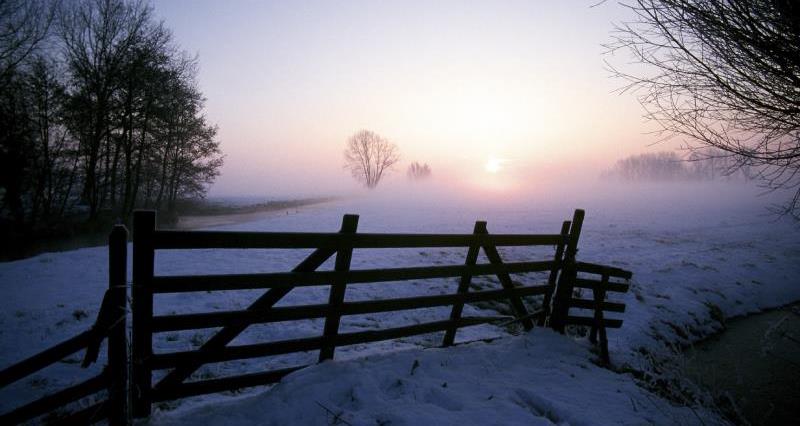Winter guidance
Red diesel, gritting, snow clearance and flood clear up
Many members may take part in gritting this winter to help keep the roads open and vital services moving. Here is a quick explanation on the rules on red diesel and gritting:
Red diesel can be used by tractors, material handlers and light agricultural vehicles for road activities. Use of red diesel is allowed for the gritting of road, travel to and from where gritting takes place and for the collection of equipment and material for gritting.
Red diesel is not permitted for gritting used on private land, eg supermarket car parks.
Further guidance on the use of red diesel is available from CallFirst on 0370 845 8458, ���Ի����ٳ����NFU Business Guide 101 Red Diesel available here.
Tractors, snow clearing and insurance
Many insurers will automatically provide insurance cover for snow clearing activities or action to rescue stranded motorists but only if it is on a not for profit basis. This means that the farmer concerned is not being paid or making any sort of profit. In any event best advice is to check with your insurance provider before starting activity.
If farmers have a contract with councils or other organisations and they are being paid for snow clearing or recovery work then this should be notified to the insurer who will amend the policy to extend cover for these types of commercial activities. There will most likely be an additional premium to pay for this type of “diversification” activity as it is not pure farming work.
If there is any doubt as to whether correct insurance is in place contact the insurer to clarify the cover in place before starting any activity.
Members may want to confirm snow clearing rates with regards to any contracts for snow clearing before the start of winter.
Working in low temperatures
Temperatures in indoor workplaces are covered by the . These regulations place a legal obligation on employers to provide a ‘reasonable’ workplace temperature.
The regulations do not apply to fields, woods or land forming part of an agricultural holding.
They do apply to agricultural buildings eg pack houses.
There is an which recommends the minimum temperature in a workplace should normally be at least 16 degrees Celsius. If the work involves vigorous physical effort the temperature should be at least 13 degrees Celsius.
and from CallFirst on 0370 845 8458.
Reducing energy costs in winter
The best way to reduce energy costs from NFU Energy this winter:
- Consider using smart, web-based systems to monitor and control operations remotely (we can help with this).
- Check settings and accuracy of heating and ventilation.
- Check any water heater temperatures to avoid the expense of overheating.
- Switch off lights and other equipment when not required.
For more energy and money saving tips see .
���ܳ�����������ܾ��岹�Գ�����

The Institution of Occupational Safety and Health (IOSH) has provided downloadable guidance on controlling sun exposure at work, and spotting the risks of skin cancer: .
This advice includes:
- Covering up exposed skin
- Wearing a hat to protect your head
- Seeking shade during the hottest part of the day
- Frequent application of sun screen during the day
- Drinking plenty of water
- Checking for changes to your skin
The HSE has produced a leaflet containing guidance for employers of outdoor workers:
The NHS provides guidance on and recognising the
Macmillan provides information on , and what to do if you notice skin changes.
Tips for working in hot weather
- Stay hydrated. Drink plenty of fluids.
- Avoid dehydrating liquids. Alcohol, tea, coffee and caffeinated soft drinks can hurt more than help.
- Wear protective clothing. Lightweight, light coloured and loose fitting clothing helps protect against heat. Change clothing if it gets completely saturated.
- Pace yourself. Slow down and work at an even pace. Know your limits and work safely in heat. If possible, avoid work at the hottest time of day. Work in the shade if you can.
- Schedule frequent breaks. Take time out for rest periods and water breaks in shaded or air conditioned areas.
- Use a damp rag. Wipe your face or put it around your neck.
- Avoid getting sun burn. Cover up – don’t forget the back of the neck. Wear a hat. Use sun screen.
- Be alert to signs of heat-related illness. Know what to look for and look out for others working with you. Signs include headaches, dizzy spells, loss of appetite and nausea, excessive sweating, cramps in the arms, legs and stomach, fast breathing and pulse, a temperature above 38C, and intense thirst.
- Avoid direct sun. Find shade or block out the sun if possible.
- Eat cold foods. Particularly fruit and salads with high water content.
More from �ʼһ���:
You may also be interested in:
- NFU Weather Outlook- showing monthly weather patterns and provides a summary of notable weather events, mean rainfall and mean temperature.
